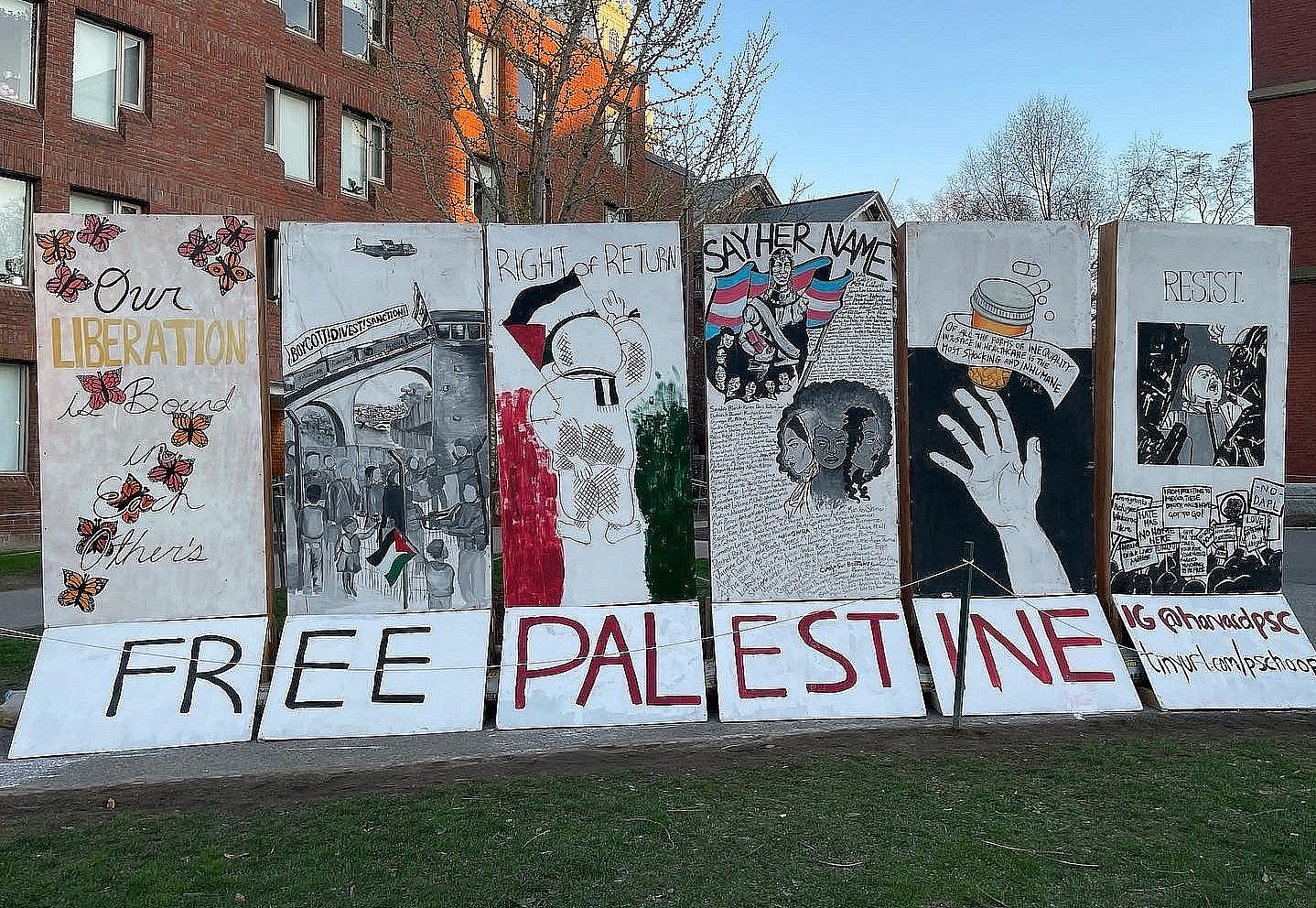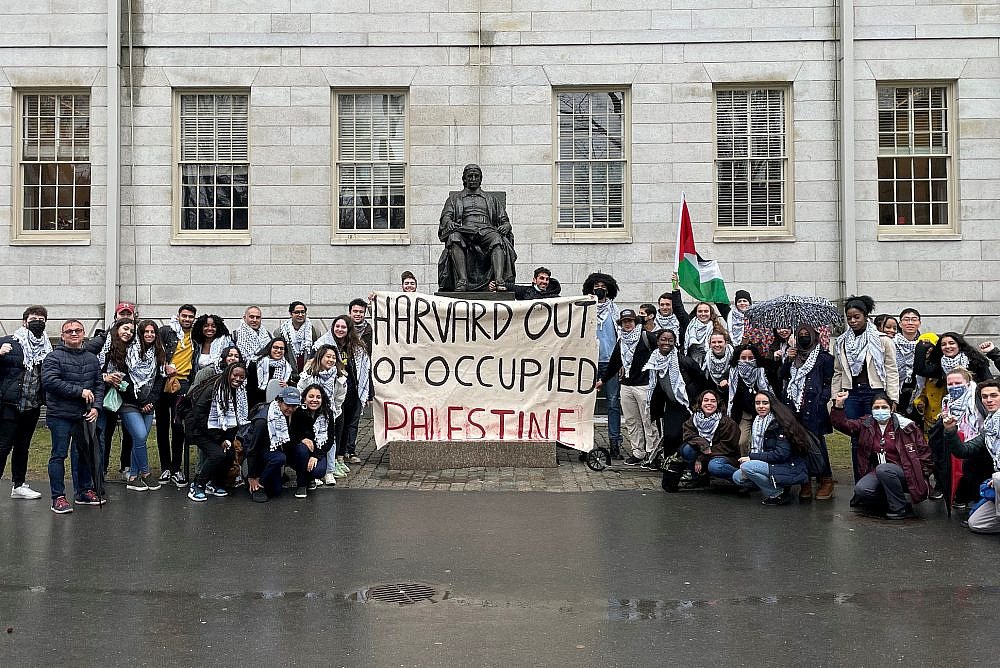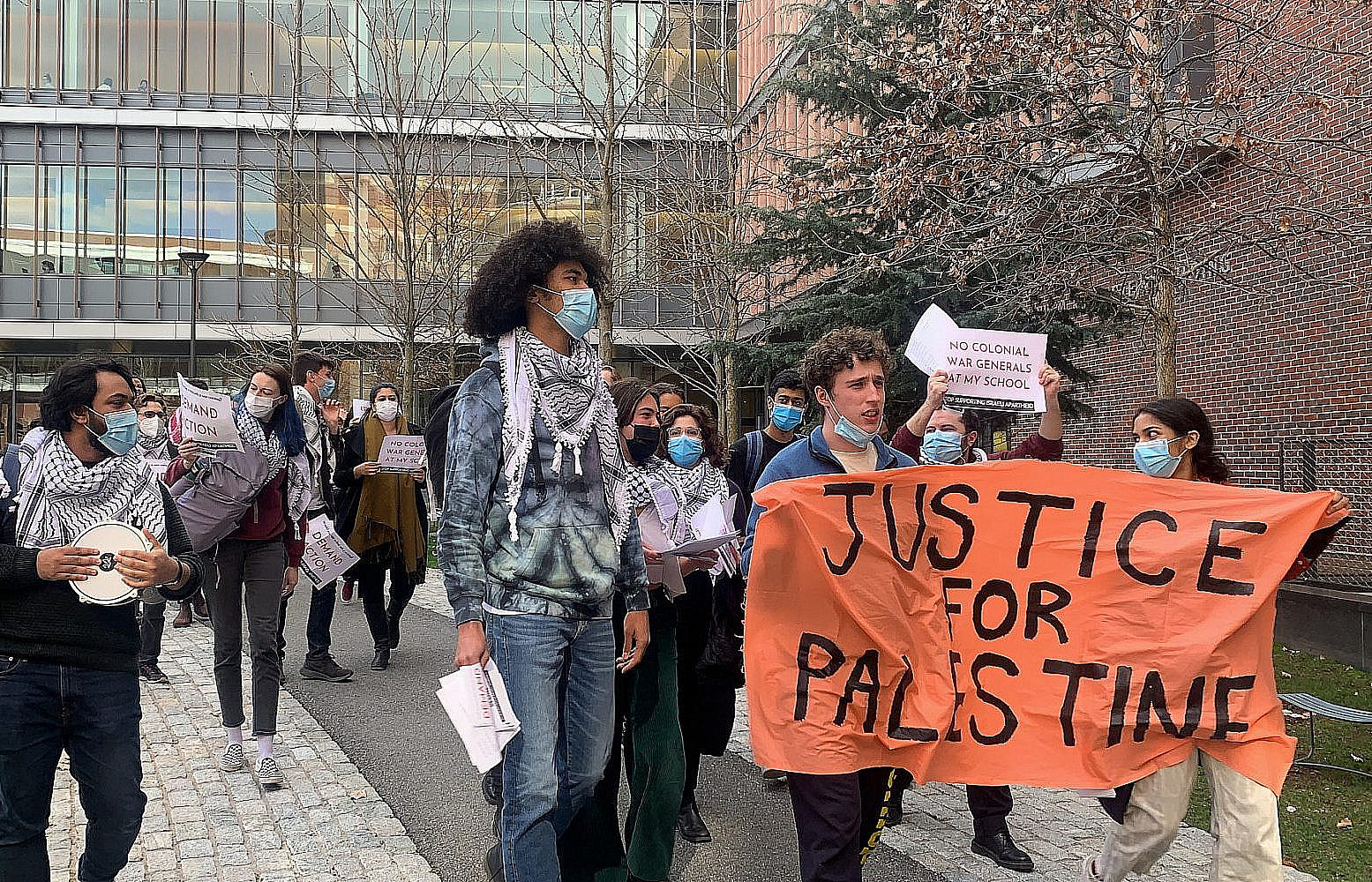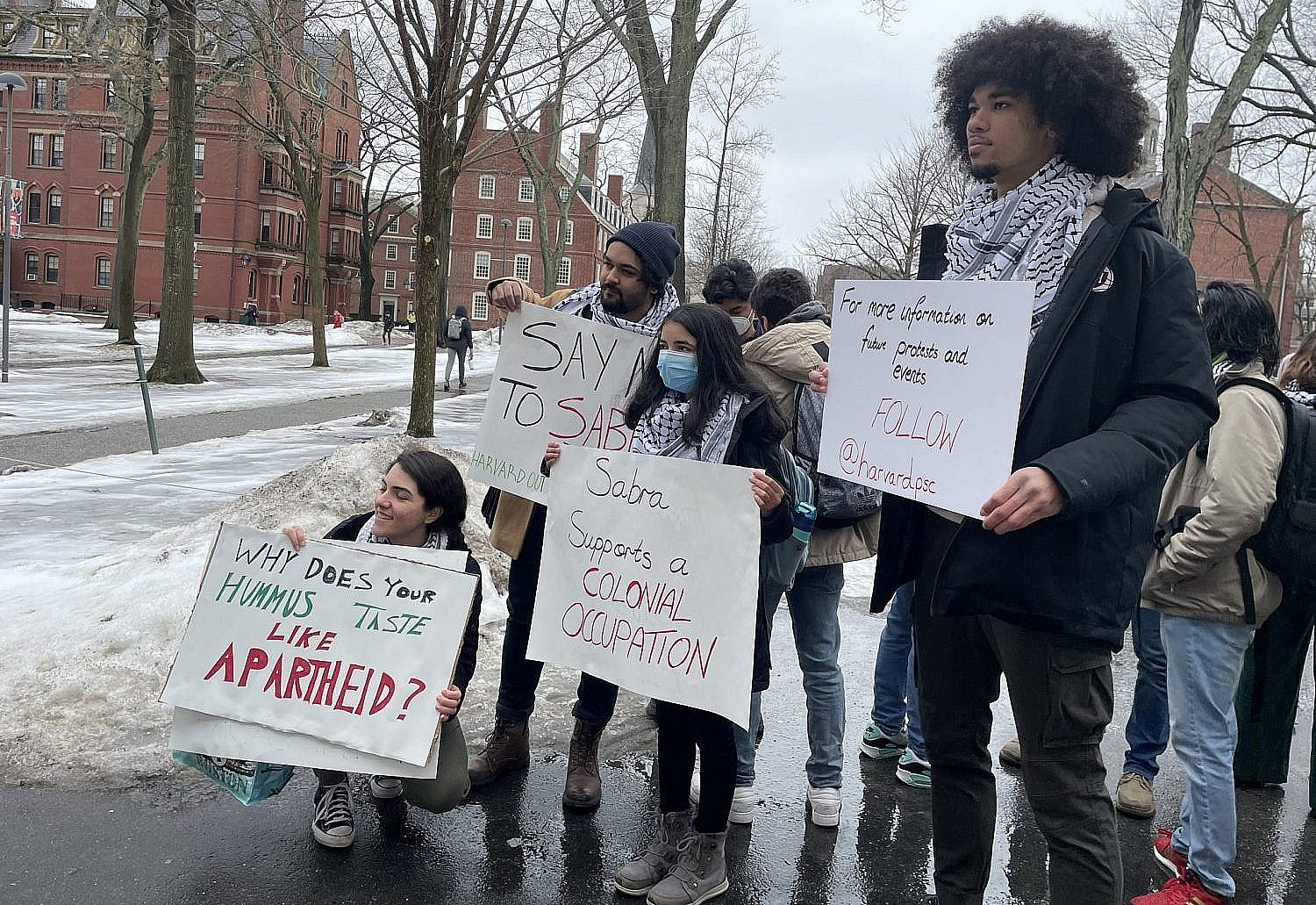It’s April 29, 2022, and the excitement is palpable in the small computer room in Adams House, one of Harvard’s 12 residential houses. Mohammed Assaf’s “Dammi Falastini” (“My blood is Palestinian”) is blaring on someone’s speaker, as five keffiyeh-clad members of Harvard College’s Palestine Solidarity Committee (PSC) share baklawa and hunch over the copy machine, trying to make a perfect scan of that day’s edition of the Harvard Crimson, the university newspaper.
After much back and forth, we finally get an angle that looks just right. “EDITORIAL: In Support of Boycott, Divest, Sanctions and a Free Palestine.” It isn’t Keffiyeh Thursday — a weekly visibility campaign by PSC to wear the Palestinian scarf across campus as an act of solidarity — but we joke that from here on out, every day will be Thursday.
In a campus environment that has often been hostile toward any form of Palestine advocacy, the Crimson Editorial Board’s unequivocal endorsement of BDS in late April was not just unexpected; it exemplified the major shift taking place in student opinions on Palestine across the United States, following years of grassroots advocacy and mobilization.
For decades, student organizers on Harvard’s campus have hosted speakers, organized rallies and walkouts, and publicly advocated for Palestinian human rights. And throughout those years, Harvard PSC has been no stranger to pushback and dissent at the institutional level.
As we celebrate this landmark achievement, it is important to take stock of the arduous struggles undertaken by current and former PSC members that have made this moment possible and impacted so many students — at Harvard and beyond.
A history of activism and pushback
Harvard PSC was founded in 2002. The peak of our organizing efforts every year is Israeli Apartheid Week (IAW), a week-long series of events that aims to initiate conversation on campus and beyond to promote further understanding of the Palestinian struggle for liberation and what life looks like under occupation. Each year, we also build an eight-foot high “Apartheid Wall” in the center of campus, featuring artwork that addresses different intersectional struggles with parallels that speak to the Palestinian cause.

In February 2020, we launched our divestment campaign, Harvard Out of Occupied Palestine (HOOP), demanding the university disclose its direct and indirect investments in companies complicit in human rights abuses against Palestinians, divest such holdings, and reinvest in Palestinian history, culture, and communities.
These activities have, of course, been met with relentless attacks. In 2019, the Undergraduate Council staged a contentious public vote to decide whether or not PSC’s annual IAW programming should be funded like other organizations. The vote, which eventually ruled in favor of granting PSC funds, was spearheaded by students who rejected PSC’s emphasis on BDS as a means of addressing oppression in Palestine.
“For the entirety of the meeting, we had to sit there and convince our peers who opposed us and had historic and current institutional backing that we, [Palestinians and allies], deserve to host events,” says Nadine Bahour, a Palestinian senior at the college. “The power imbalance was beyond imaginable, and the opposition was unlike any faced by the [other] 350+ student organizations at Harvard.”
That was the last IAW before the pandemic. This year, we returned to in-person programming and the panels of our Apartheid Wall once again found a home on Harvard’s campus in April. For most undergraduate students, this was the first time seeing our mock wall in real life. “It was emotionally very powerful to see a radical art display in the middle of Harvard’s campus built on the premise of solidarity from a range of backgrounds,” shared Asmer Safi, a sophomore.
For senior students, on the other hand, the return of IAW was the revival of a memory. “Every year the wall starts off as a begrudging process of transportation and construction. But every year, it quickly becomes an unanticipated source of camaraderie and bonding,” recounts Christian Tabash, a senior. “Each year that I’ve worked on the wall, I’ve gotten to know those around me better since we’re spending virtually an entire weekend assembling it. And when the wall is all done, it really recalibrates our work and perspective at the university, reminding us of what is truly at stake.”
Visible shifts on campus
The entirety of this year’s IAW programming attracted severe backlash and smear campaigns. These included aggressive emails, articles that condemned our organizing, propaganda posters against our installations, and a counterprotest organized by the Israel initiative of the well-resourced Harvard Hillel, a chapter of Hillel International, which has a policy of rejecting partnership with anti-Zionist student organizations.
This pushback against Harvard’s PSC does not only come from other students or student groups. The disputes with PSC organizers are often fueled in part by people on Harvard’s payroll — employees of the university and professors who wield significant institutional power — as well as prominent alumni.
On campus, this manifests in a major imbalance of power, resources, and institutional backing between student organizations calling for Palestinian freedom versus parties actively trying to quash our voices. The rhetoric of the latter is all-too-familiar in the context of Palestine, where the misleading framing of a “conflict” both purposefully and inadvertently portrays a symmetry in the phenomenon of oppression.
The Crimson newspaper has historically platformed these powerful voices, covering PSC events and campaigns in a negative light, falsely accusing members of antisemitism, and implying or directly stating that efforts to organize and advocate for Palestine are radical, extremist, or controversial because the reality is “complicated.” This type of coverage on campus is itself a microcosm of wider media attitudes toward Palestine in the United States.

Hosam Nasr, a recent alumnus and PSC organizer, shared that during his time at Harvard, “the Crimson was one of the more hostile entities on campus toward the PSC and the Palestinian cause at large. Their policy of not allowing Palestinian students to publish anonymous op-eds about the plight of the Palestinians, claiming that the threat of being blacklisted [by far-right pro-Israel organizations like Canary Mission] was not a severe enough threat, effectively silenced pro-Palestinian voices on campus, my own included.” To Nasr, the recent BDS editorial is “an acknowledgement of this very real threat.”
This shift in student opinion that Nasr experienced is extending far beyond Harvard’s campus. The tide on college campuses across the United States is changing, and student groups are successfully passing referendums calling for their institutions to divest from Israeli apartheid. Brown University was the first Ivy League university to pass such a referendum in 2019; Columbia University followed in 2020, and the list is quickly growing.
Our divestment campaign at Harvard has achieved some successes of its own. This year, we have focused our efforts on targeting Sabra food items in our dining halls; protesting a study group at Harvard Kennedy School led by a veteran Israeli general; and calling for a boycott of the annual Hillel-funded Spring Break trip to Israel.
During each one of these campaigns, our organizers have faced opposition both institutionally as the PSC and at the personal level. But despite these intimidation tactics, we have still witnessed progress. Whether it was the students turning down their spots on Israel Trek, or the residential house administrators removing Sabra from dining halls, we have seen that boycotting is an effective tool to raise awareness, change opinions, and leave a lasting impact.
Moving forward from this pivotal moment
In the last few weeks, the Crimson has been inundated with angry op-eds, letters from alumni, and hateful rhetoric from people in positions of power, including at the level of the U.S. government and large organizations like the Anti-Defamation League (ADL). The backlash that PSC and Crimson members now face is an unpleasant but predictable consequence of our relentless organizing and unequivocal calls for the liberation of the Palestinian people.
It is not despite this very backlash, but because of it, that we are holding our ground. Our detractors may hold institutional power, but true power lies in numbers, and our collective student body is making our voice heard even louder.
More and more young people are thinking critically about Palestine as a social and racial justice issue, and that change is what goes on to fuel our work. And it is heartening to see that we are not alone: as Harvard affiliates (primarily alumni) attempt to demonize the Crimson’s recent move, many faculty members have come forward to support the newspaper and BDS, centering human rights and affirming student activists.
As always, PSC will continue working toward supporting the Palestinian struggle for self-determination, justice, and equality. We will not be silent about Israel’s human rights abuses. We will not be intimidated by opposition. We will continue to fight for a free Palestine.



